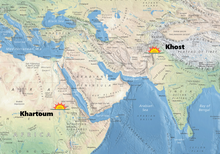
Back قصف صواريخ كروز على أفغانستان والسودان (أغسطس 1998) Arabic Operaatio Infinite Reach Finnish Opération Infinite Reach French Operação Infinite Reach Portuguese 无限延伸行动 Chinese
| Operation Infinite Reach | |
|---|---|
| Part of the Afghan conflict | |
 Map showing the two sites of attacks | |
| Locations | 15°38′45″N 32°33′42″E / 15.64583°N 32.56167°E |
| Planned | 7–20 August 1998 |
| Target | Al-Shifa pharmaceutical factory and Afghan training camp |
| Date | 20 August 1998 |
| Executed by | |
| Outcome | United States failure |
| Casualties | 6–50 militants killed |
Operation Infinite Reach was the codename for American cruise missile strikes on al-Qaeda bases that were launched concurrently across two continents on 20 August 1998. Launched by the U.S. Navy, the strikes hit the al-Shifa pharmaceutical factory in Khartoum, Sudan, and a camp in Khost Province, Afghanistan, in retaliation for al-Qaeda's August 7 bombings of American embassies in Kenya and Tanzania, which killed 224 people (including 12 Americans) and injured over 4,000 others. Operation Infinite Reach was the first time the United States acknowledged a preemptive strike against a violent non-state actor.[5]
U.S. intelligence wrongly suggested financial ties between the al-Shifa plant, which produced over half of Sudan's pharmaceuticals, and Osama bin Laden; a soil sample collected from al-Shifa allegedly contained a chemical used in VX nerve gas manufacturing. Suspecting that al-Shifa was linked to, and producing chemical weapons for, bin Laden and his al-Qaeda network, the U.S. destroyed the facility with cruise missiles, killing or wounding 11 Sudanese. The strike on al-Shifa proved controversial; after the attacks, the U.S. evidence and rationale were criticized as faulty, and academics Max Taylor and Mohamed Elbushra cite "a broad acceptance that this plant was not involved in the production of any chemical weapons."[6][c]
The missile strikes on al-Qaeda's Afghan training camps were aimed at preempting more attacks and killing bin Laden. These strikes damaged the installations, but bin Laden was not present at the time. Two of the targeted camps were run by the Inter-Services Intelligence of Pakistan who were training militants to fight in Kashmir; in all, five ISI officers were confirmed killed and at least twenty militants also died.[b] Following the attacks, Afghanistan's ruling Taliban allegedly reneged on a promise to Saudi intelligence chief Turki bin Faisal to hand over bin Laden, and the regime instead allegedly strengthened its ties with the al-Qaeda chief.
Operation Infinite Reach, the largest U.S. action in response to a terrorist attack since the 1986 bombing of Libya,[7] was met with a mixed international response: U.S. allies and most of the American public supported the strikes, but many across the Muslim world disapproved them, viewing them as attacks specifically against Muslims, a factor that was further capitalized by radicals.[8] The failure of the attacks to kill bin Laden also enhanced his public image in parts of the Muslim world. Further strikes were planned but not executed; as a 2002 congressional inquiry noted, Operation Infinite Reach was "the only instance ... in which the CIA or U.S. military carried out an operation directly against Bin Laden before September 11."[9]
Cite error: There are <ref group=lower-alpha> tags or {{efn}} templates on this page, but the references will not show without a {{reflist|group=lower-alpha}} template or {{notelist}} template (see the help page).
- ^ Wright 2006, pp. 284–286.
- ^ Crumpton 2012, p. 111.
- ^ Coll 2005, p. 411.
- ^ Barletta 1998, p. 116.
- ^ Perl 1998, p. 3.
- ^ Taylor & Elbushra 2006, p. 464.
- ^ Naftali 2006, p. 266.
- ^ Newsweek Staff (August 30, 1998). "'Our Target Was Terror'". Newsweek. Retrieved January 30, 2023.
- ^ Report of the Joint Inquiry into Intelligence Community Activities before and after the Terrorist Attacks of September 11, 2001, p. 297.
© MMXXIII Rich X Search. We shall prevail. All rights reserved. Rich X Search